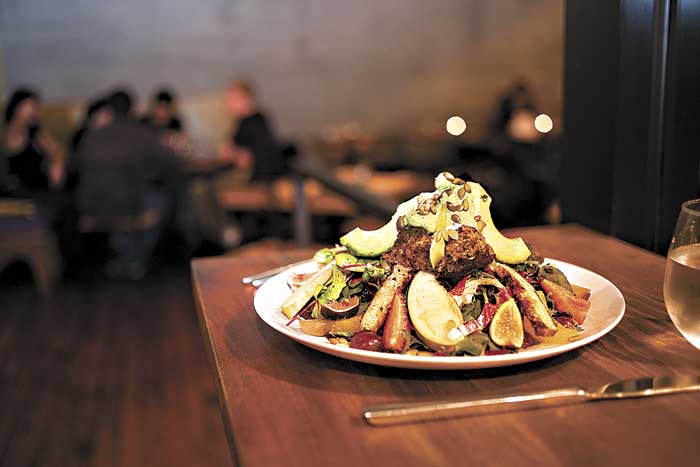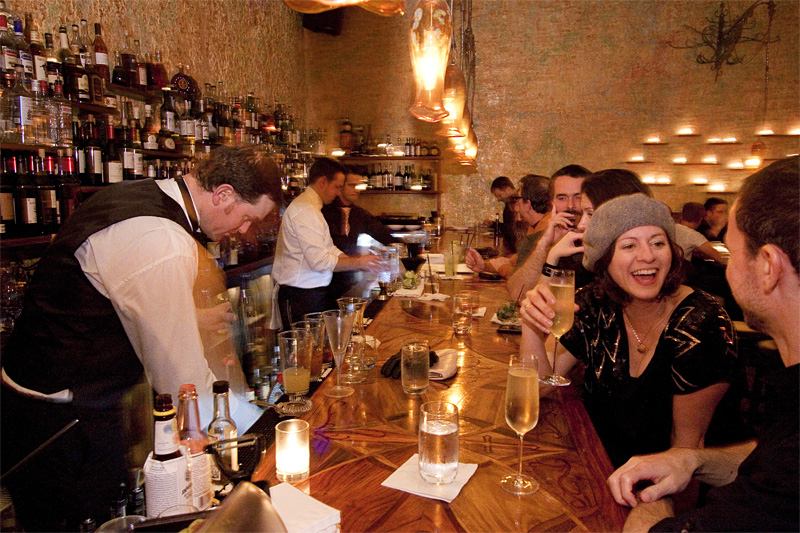Recession be damned, Makini Howell picked a good time to open Plum Bistro, her all-vegan restaurant on Capitol Hill. While veganism still threatens to turn any dinner party into a social nightmare, it’s hardly a fringe movement. The chick-lit vegan manifesto Skinny Bitch is still on the New York Times bestseller list (1.1 million copies and counting), and A-list cookbook author Mark Bittman recently announced that his new lower-meat diet entailed eating vegan until sundown. No-meat, no-dairy, no-egg, no-honey cookbooks now number in the hundreds, heavily weighted toward home-ec-style titles like 30-Minute Vegan, The Convenient Vegan, and The Joy of Vegan Baking.
New generations of eaters don’t associate meat-free meals with poverty as their grandparents did, but with lower cholesterol, smaller carbon imprints, and animal liberation. And a new Harris Interactive poll projected that 0.8 percent of the U.S. population—that’s 2.4 million people—are now vegan, up from 0.5 percent just three years ago. Whether they’re all going through a phase or embracing the egg-free lifestyle for good, the vegan army is manning up, and it’s hungry as hell.
It’s willing to spend money, too. Howell and her family, who own the Hillside Quickie sandwich shops in Capitol Hill (where Howell has been chef) and the U District (run by her sister) are already well-known in vegan circles. Plum is Makini’s step up, with higher prices and more complicated dishes. In fact, it may just be the dressiest all-vegan restaurant in Seattle.
You have to stand forever for your tofu burger at Hillside Quickie, pressed into a crowd of customers begging you to test their theory that vegans don’t smell as strongly as omnivores do. At Plum, you can sit down at a table, with a glass of organic red wine and a votive candle, while you wait for one of the servers to bring you tweaked-up versions of the same faux-meaty sandwiches. For instance, Plum’s BBQ po’ boy seems cleaner and less messy than the version at Hillside; lightly pressed between halves of a seeded baguette are fat chunks of seitan that have soaked up a half-pint or so of tangy-sweet barbecue sauce, with a smattering of Hello Kitty–pink pickled red onions on top. While the Hillside version needs to be eaten over the sink, lest you look like a random victim on Dexter, at Plum, the sandwich never spills out. Plus it’s garnished with a mass of sweet-potato fries covered in soy-mayonnaise scribbling.
Or maybe the sandwich just tastes better because of its surroundings. Howell took over Cafe Stellina’s space in the Piston & Ring building—and did nothing to it. Instead, she’s banking on the striking appeal of the raw space, with its concrete walls and hardwood floors, its slim wood tables, its open kitchen, and its garage-door front window, which transforms the entire room into a patio on warm days. Stellina’s former owners left with their artwork, and Howell hasn’t bothered to replace it. Right now she’s keeping the roll-up window open every possible moment, letting the sun and breeze work their wiles. Come October, she’s going to need to add some color, however, or else the gray room is going to feel like dining in the State Pen.
The thing about Howell’s food, with its fried tempeh this and smoked gluten that, is that the chef is taking on the thorniest problem of veganism: finding substitutes for meat, dairy, and eggs. She doesn’t just want to tackle the problem; she wants to throw it down, stomp on it, and crow victory. Many vegan cooks co-opt dishes from cuisines with strong vegetarian traditions, and escape comparisons to what might be missing. But Howell’s culinary base is Southern cuisine: burgers instead of stir-fries, only one curry, no steamed vegetables with tahini dressing. Thus, faking what’s missing is essential.
For the Cajun-spiced “mac ‘n’ yease” (Howell’s name for vegan cheese), for example, she tosses the macaroni in a thick cream with the tang of nutritional yeast plus the low-level bite of mustard. It’s not going to pass for Tillamook, but it’s far better than the neon-orange “real” cheese-food product Kraft uses to coat its mac ‘n’ cheese. In a similar vein, the nooks and folds of her collard greens are filled with crumbled smoked tofu and seitan. The gentle smokiness they add to the greens—which are great, by the way—may not convince you that you’re eating smoked ham hock, but it might suggest that the pork wasn’t all that necessary in the first place.
The diners who’ll enjoy Plum the most are the ones who accept several premises. One, that fake meat is its own thing, with its own textures—the soft porosity of gluten, the grainy crack of fried tempeh, pressed tofu’s firm chewiness. People who really want a jerk-chicken sandwich aren’t going to find it in the spice-saturated tofu “crazy Jamaican burger.” And you have to have a taste for the healthy, whole-grain flavors of the 1970s, which come through, for example, in the nutty, sesame-flecked breading on Howell’s fried okra. She successfully amps up the crunch and spice in order to cover okra’s slimier qualities, though the jaw tends to feel strained afterward.
In short, Plum’s is some of the zestiest, most full-bodied vegan food I’ve ever tasted. But I’d like to see Howell lighten up: not so much soy mayonnaise on the sandwiches, for instance, and a lighter fry on her tofu rolls, which had clearly been pulled from the fryer just as they started to explode, the influx of oil dulling their tofu-tomato-citrus contents. And I could stand for a few fewer ingredients in Howell’s Mama Africa salad, one of the restaurant’s signature dishes. Even an omnivorous cook would think twice before combining nectarines, grapes, and figs with bacon and avocado-chile purée; so even when the bacon’s made from soy, the salad would be brighter and more cohesive without the fake meat.
The chef’s definitely got brawny flavors down. She only needs to wield her power with more finesse.






